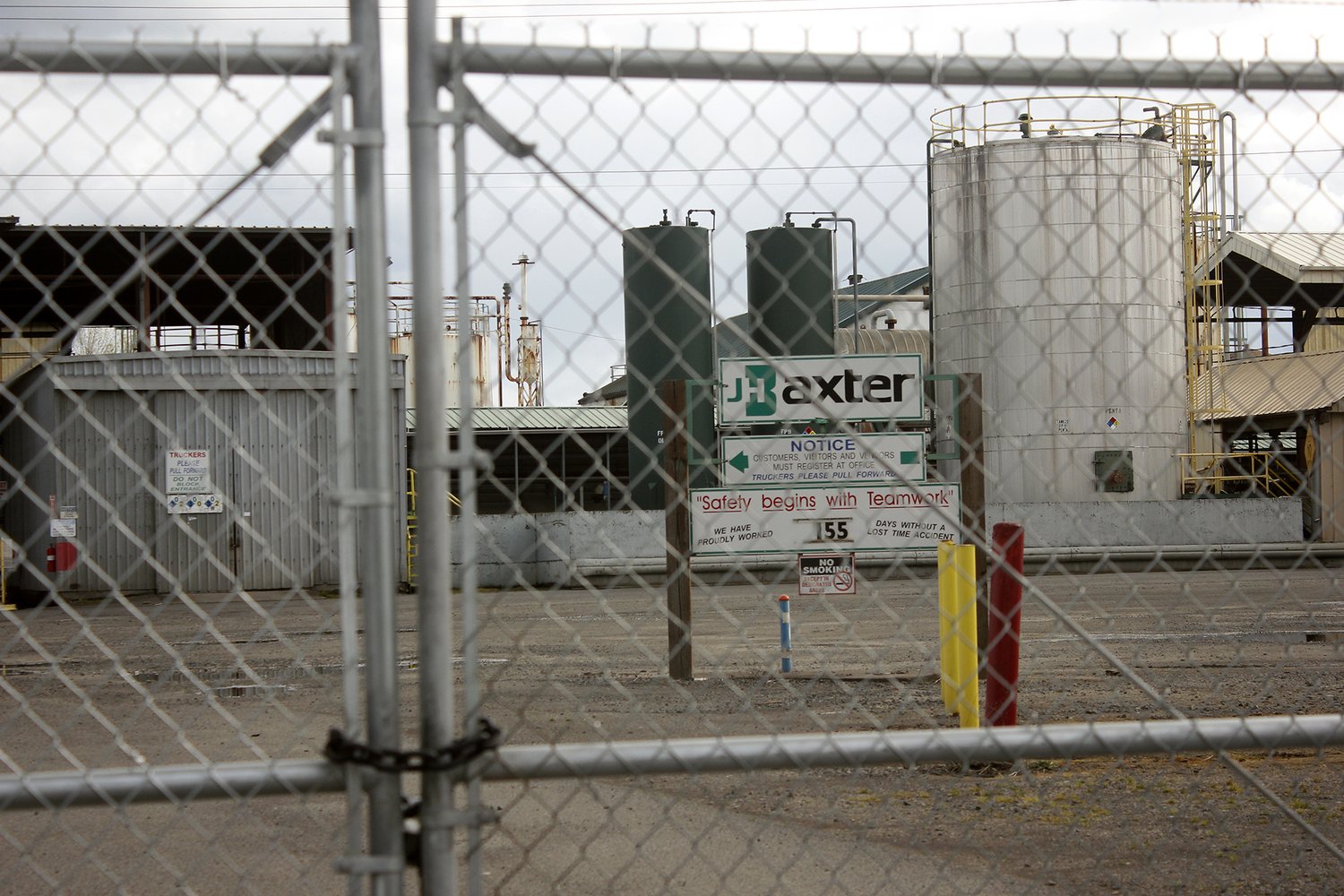Struggling to Breathe
In Bethel, a neighborhood in West Eugene, Oregon, residents have wrestled with local government agencies and industries in a fight for better air quality.
Struggling to Breathe
A neighborhood's fight for healthier air
Writer and photographer

The entrance to J.H. Baxter, on Roosevelt Blvd, sits empty after closing in 2022. A skeleton crew remains onsite to ensure operations meet environmental regulations.
I’m driving down Roosevelt Blvd, on my way to visit Bethel resident Lin Woodrich, when the scent of something like gasoline hits me. At first, I wonder if there’s something wrong with my car. Then I remember that this is the street J.H. Baxter, a 33-acre wood processing plant, is located.
Drive around Bethel, a neighborhood in Eugene, Oregon, and you’ll pass a highway, an elementary school, rows of houses, a scrap metal recycling center, the J.H. Baxter facility—all in the span of 10 minutes.
Woodrich is a 68-year-old retiree who has lived in Bethel for almost three decades. She says she’s proud of the home she’s built there, with its seven raised beds in the front yard and seven fruit-bearing trees in the back (two almond trees, one plum tree, one apple tree, two peach trees, and a pear tree).
If you’ve ever attended an event in Bethel, you might have seen Woodrich. She can almost always be spotted under the Active Bethel Community tent, with her cropped gray curls, high-visibility vest, and a white button on her lapel that reads “Choose Kindness.” She serves as the co-chair of Active Bethel Community (formerly Active Bethel Citizens), the neighborhood association for Bethel, and she’s also the chairperson of four of its 11 committees. Although she’s a prominent figure in the community today, her activism is a recent development. It was only when Donald Trump was elected in 2016 that she became more involved.
“I was afraid that he would push the nuclear button at any moment,” Woodrich says. “He was nuts.”
The election alerted Woodrich to the issues in her community, and since her son had moved out, she finally had time to dedicate to local causes—including the fight to hold J.H. Baxter accountable for their emissions in the Bethel neighborhood.
Bethel is a section of West Eugene, Oregon, where air quality issues have plagued residents for years.
Baxter’s 33-acre facility has long been suspected of contaminating nearby neighborhoods with air and water pollution. Most processing plants, like the shuttered J.H. Baxter, produce harmful compounds called air toxics. The plant’s activities gave Bethel’s air a distinct chemical scent that some liken to gasoline.
“Just driving down Roosevelt, I had to hold my breath,” Woodrich says about the street J.H. Baxter is on.
Beginning in 1943, J.H. Baxter manufactured products like electrical poles and railroad ties by chemically treating wood with creosote, pentachlorophenol (PCP) and ammoniated copper zinc arsenate. The facility emanated noxious fumes that residents of the surrounding neighborhood often complained about. Air quality complaints against J.H. Baxter peaked in 2007–that year, the Lane Regional Air Protection Agency (LRAPA) received over 700 complaints about the facility.
When the LRAPA conducted testing at 12 sites surrounding the plant in 2005, they concluded that naphthalene was the only Hazardous Air Pollutant (HAP) that exceeded the Oregon Department of Environmental Quality’s (DEQ) air toxics benchmark. Following these tests, the Oregon Health Authority (OHA) concluded that this level of naphthalene in the air wasn’t high enough to cause health problems.
But according to the OHA, West Eugene has higher rates of lung cancer and Hodgkins’ Lymphoma are slightly higher than in the rest of the state. And Bethel residents have long complained of headaches, watery eyes, and respiratory issues.
Woodrich knew about J.H. Baxter before becoming an activist, but she didn’t feel like there was anything she could do about their pollution. It was only when Beyond Toxics, a local environmental justice non-profit, began working with Active Bethel Community, that Woodrich began to think that change was possible.
Mysti Frost was conducting a health survey for Beyond Toxics in 2017 when she felt a headache coming on. She was in Bethel, knocking on doors to ask residents how they felt about living across the street from J.H. Baxter. She suspected that the headache came on because of her proximity to the facility.
Frost has lived in Eugene, Oregon for almost three decades. She volunteered with Beyond Toxics for years when, in 2017, she was given a job as Environmental Justice Community Organizer. The same year, Eugene Mayor Lucy Vinis nominated her for the LRAPA’s Board of Directors.
Working in Bethel was hard at first–Frost had to build trusting relationships in a neighborhood she wasn’t a part of. But after years of attending events, connecting with residents through social media, and using her ability to speak Spanish to connect with the Spanish-speaking residents, she became a trusted figure in the community.
While things were going well for Frost out in Bethel, it was a different story in LRAPA’s board meetings.
During her time on LRAPA’s board, Frost wrestled to bring Bethel’s air quality issues to the forefront. Her frustration bubbled up at the penultimate meeting of her three-year term, which took place in May 2021. She broke down in tears as the board discussed DEQ’s infrequent soil testing around J.H. Baxter.
“We're LRAPA, Lane Regional Air Protection Agency. We're not Business Protection Agency. We're not Industry Protection Agency, we're Air Protection Agency,” Frost recalls saying. She remembers being frustrated that LRAPA claimed no responsibility for soil testing even though she believes air and soil pollution are deeply intertwined.
Travis Knudsen, spokesperson for LRAPA, said that the organization has been working hard to collaborate with Bethel. But to residents like Woodrich, LRAPA hasn’t been doing the work fast enough.
“All of their tests are awfully slow. And they seem like they're, you know, whenever they have a request for an extension on something, they always granted it, and it just seems like they're not holding their feet to the fire as much as I would,” Woodrich says.
Governor Kate Brown enacted the Cleaner Air Oregon (CAO) program in 2019. The program aims to hold industrial and commercial facilities accountable for their air contaminant emissions. As part of the program, LRAPA began working on a report of J.H. Baxter’s toxic emissions. The assessment is a time-consuming process that is expected to be completed in late 2022 or early 2023, a timeline that Woodrich said she finds frustrating.
“These are people, this isn't just data,” she says. “You can't just wait for results to come back and analyze them and the data and everything.”
In September 2020, the DEQ received concerning results from soil tests conducted near J.H. Baxter. These results, combined with data from LRAPA’s air quality monitoring and the DEQ’s own wastewater programs, spurred the DEQ to create the J.H. Baxter Community Engagement Core Team, which included representatives from Active Bethel Community (including Woodrich) and LRAPA.The team first met in December of 2020 to begin discussing how to hold the plant accountable for their actions.
Testing around the facility continued. Then, in late 2021, the DEQ found elevated levels of dioxins, toxic chemicals formed by the combustion of wood or the bleaching of wood pulp, in the soil of homes near J.H. Baxter. The Environmental Protection Agency (EPA) states that dioxins can cause health issues such as cancer and reproductive and developmental problems.
J.H. Baxter ceased operations in January 2022, citing market volatility and diminished margins. As of this writing, the company is keeping a skeleton crew “to manage groundwater and stormwater systems to comply with environmental requirements,” according to an online statement issued by J.H. Baxter and Company.
The DEQ has fined J.H. Baxter over $300,000 for myriad environmental violations dating back to 2015. The violations included the release of wastewater that exceeded limits of copper and the improper use of their equipment to evaporate waste.
Frost credits the closure to a perfect storm of factors, including the findings by government agencies and intense public pressure.
Bethel residents are now working to get the plant to pay for the replacement of the contaminated soil.
Thanks to the efforts of Bethel’s community and Beyond Toxics, the community is moving towards a healthier, more environmentally friendly future.
Eugene city councilors have proposed the establishment of a Health Overlay Zone, which will ensure future development will “promote a healthy environment and improved quality of life,” according to Beyond Toxics’ website.
A Health Overlay Zone will give city council the power to prevent any new polluters and chemical plants from moving into the neighborhood. The city has also proposed the introduction of risk bonds, which will hold polluters financially responsible for their impact on surrounding communities.
During a Beyond Toxics forum in March 2022, Laura Allen, a member of the Eugene Sustainability Commission, compared risk bonds to the insurance required for contractors working on a home. “If you want someone to work on your house, you hire a contractor, they have to have insurance, liability insurance, to address any potential problems they could cause by accident to your home, “ she said.
A risk bond could also take the form of fees paid for toxic emissions.
These policies are still in their early stages, but Frost and Woodrich have expressed their optimism for the future and satisfaction with the progress they’ve made.
“If there's no more fight, then they win. The fact that there's still an issue to fight about doesn't mean that we've lost. It just means that we haven't given up,” Frost says.
Later, I visit Woodrich at her Bethel home on an overcast morning in June. We’ve thankfully just missed the rain–the ground is damp and the petrichor rises to envelop us.
As a gift, she hands me one of her favorite roses, a Double Delight, which she grew herself. When I bury my nose in it, it smells sugary-sweet.
The air smells nothing like gasoline.


